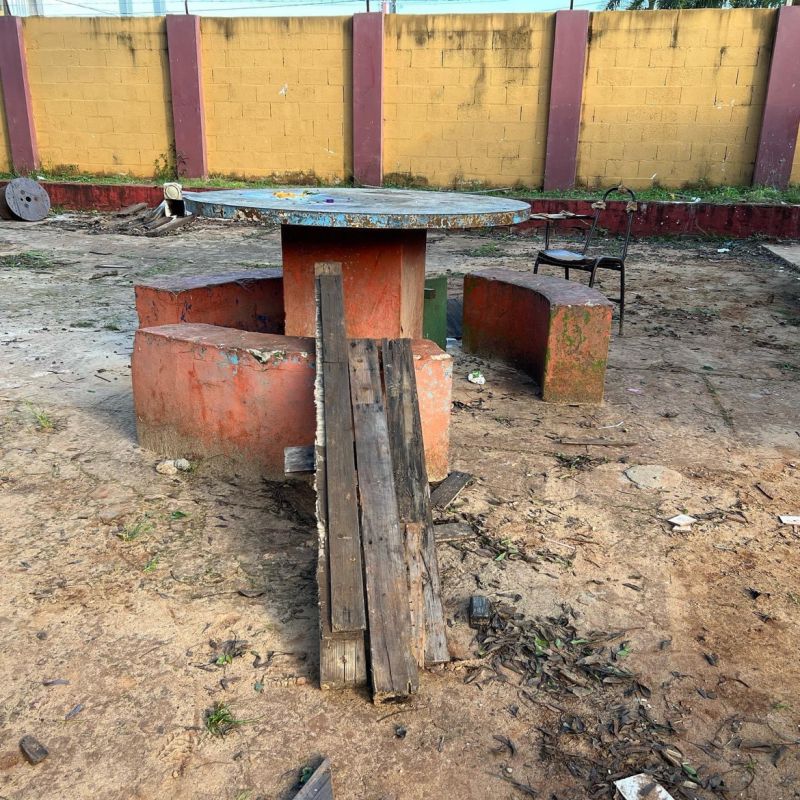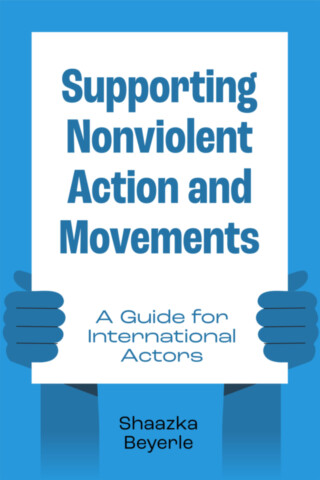Minds of the Movement
An ICNC blog on the people and power of civil resistance
by Shaazka BeyerleJune 14, 2024
Created in 2010 by a group of high school students in Ciudad del Este, reAcción Paraguay has empowered students and young professionals to tackle corruption in the public education system, particularly over the management and disbursement of funds for school infrastructure and meals from the country’s National Public Investment and Development Fund (FONACIDE). Engaging high school and university students, young professionals, parents, principals, professors and even government agencies, they educated people about their rights, led school inspections, developed civic technology such as FOCO (“lightbulb”) as a community monitoring tool, used open data to analyze and visualize policies and launched an ongoing collective identity campaign called “ParaguaYOite” to bolster social norms around integrity.
Over the years, reAcción has expanded around the country, driven national reform of procurement policy and cut corruption in FONACIDE’s resource allocation by 400% in Paraguay’s largest city. This homegrown civic initiative has engaged with external actors in a variety of ways, some direct, some indirect. After operating out of their parents’ homes, reAcción started off with small mini-grants, access to nonviolent action education and more recently, grants from the National Endowment for Democracy.
In the early 2010s, organizations that supported nonviolent collective action in this manner were not numerous. Yet today, support for it has grown significantly, notably in the U.S. context. To illustrate this, we can look no further than the announcement last fall of the U.S. Agency for International Development’s US$45 million Powered by the People fund for a consortium of 20+ organizations in over a dozen countries to enhance external support for social movement organizations and organizers around the world.
Many organizations are becoming interested in engaging with activists. Yet how does a "newbie" organization—one that is new to the nonviolent collective action space and does not have an activist network per se—decide whether to develop an initiative to support activists? What internal and external factors should the newbie organization look at to make that decision? When should an organization not engage with activists directly, and what are their alternatives? This blog post draws from my recent publication, Supporting Nonviolent Action and Movements (USIP 2024) to explore these pressing questions.

"On this table, hidden in a corner of the primary school of the Regional Education Center of Ciudad del Este, a few of us met to write reAcción Paraguay proposals and projects..." writes David Riveros Garcia, executive director of reAcción.
Know thyself: Strategic self-assessment
We need to always remember that international support does not determine the results of movements, campaigns and local civic initiatives. However, in many contexts it can contribute to an enabling environment and boost the capacities, courage and resilience of committed nonviolent protagonists, communities and citizens who collectively take action for the common good.

Supporting Nonviolent Action and Movements, by Shaazka Beyerle (USIP 2024).
A number of building blocks are essential for international actors to develop their own policies and practices. At the outset, “newbies” as well as more experienced external actors should carry out a strategic self-assessment. First, they must know themselves, i.e., evaluate their capacities, limitations, comparative advantages and assumptions vis-à-vis nonviolent movements and civic initiatives. They also should take an ecosystem approach by examining their own administrative, policy, and implementation contexts, as well as the geopolitical, political, economic and social contexts of the nonviolent movements and civic initiatives with whom they may potentially interact.
There are a series of strategic questions which can help discern the most appropriate and constructive path forward:
- WHY (should our organization support nonviolent action);
- HOW (can our organization engage ethically and constructively with nonviolent movements and protagonists)
- WHEN (timing of support given general social movement cycles). Answering these questions will help external actors—including newbies—determine…
- …WHAT IF ANY (are our options for support), such as: fostering an enabling environment; direct financial assistance; indirect financial assistance through intermediaries, pooled funding mechanisms and participatory grant-making; direct nonfinancial support; and action research support. In tandem, donors must identify…
- …WHO (interlocutors) are recipients or partners of support—should they want to engage with us.
When and why should an organization decide NOT to work directly with activists by developing a new nonviolent collective action support initiative? There are so many possible reasons. Above all is the principle of do no harm. In addition, there is a fundamental imperative that underscores all such assistance to the grassroots: LISTEN TO AND RESPECT the wishes and judgments of civic actors and regular people. By conducting the above-mentioned strategic assessment, an organization can discern if direct engagement is in the interest of those at the grassroots and if they want it.
Walk the walk: Practice solidarity, respect grassroots agency
Successful nonviolent collective action support must involve intersectional solidarity. This involves establishing connections among grassroots actors across sectors within a given context and assisting civic protagonists—and even state reformers/integrity champions—at risk. In the anti-corruption, accountability and governance realm, this can include entities focused on public service delivery, land grabbing, gender, communal violence, displacement and the like. It may feature contact between state and nonstate actors who can bridge issues, or bringing local voices up to the international level to highlight hazards and intimidation. Exposure tours are one example of the latter strategy. Due to increasing assassinations of activists in Latin America, a charity reported that it supported a trip of indigenous women’s rights defenders from that region to Washington, DC.
A multistakeholder initiative interviewee also highlighted a new goal of involving grassroots groups in their activities and “getting to constituents who do open government work but are not seen as doing it.” Other creative practices involve bringing the voices of nonviolent action protagonists to donor learning networks and consultations. For some, low-key engagement is an option. “We have informal consultations with grassroots groups,” said a bilateral donor. External actors also can involve grassroots grantees in relevant activities, such as conducting or providing input to applied research, training new grantees, and co-designing and speaking in webinars.
Several external actors foster a “community of practice” among external actors and grassroots nonviolent action leaders and organizers. For example, a private foundation’s transparency program brought movement leaders from Africa to its advisory board meeting to get their direct input on how to support movements relevant to its issue areas. Because of the stark reality of ever-closing civic space, a private foundation interviewee proposed a proactive measure: INGOs should draft solidarity and protection plans for their in-country interlocutors. “Funders need to push INGOs to develop policies to deal with closing civic space protection,” he asserted.
It’s also time we start talking about an accountability double-standard. The onus has largely been on recipients and partners to be accountable to donors. The reverse is less common. The good news is that there are a number of avenues for international actors to pursue two-way accountability, such as: holding “listening sessions” or working groups with recipients or partners; implementing anonymous evaluations of donors or intermediaries; establishing independent funder accountability councils to create mechanisms; and maintaining safe whistleblowing channels. A charity respondent reported, “We invite our partners to give us feedback so that we can continue to improve our reporting systems and partnership model.”
Don’t bite off more than you can chew
A multitude of adaptive practices provide pathways for direct and indirect support, should it be desired by activists and civil society. We can also think of an ecosystem of support based on contexts, realities and needs on the ground. A “small bites” approach to movement support fits into a do-no-harm strategy: start modestly, pilot efforts, learn and adapt rather than go for a big splash, particularly if an organization isn’t well-positioned or experienced to take on an ambitious initiative.
In a way, the only limitation is a lack of imagination. Among the many ideas I glossed from my book research:
- Provide networking opportunities for activists
- Enable convenings, that is, smaller-scale gatherings that facilitate peer learning and connections among local groups, organizations and communities is key. Connect groups and communities through materials and local learning exchanges.
- Enable marginalized communities to gain access to world-class public relations and communications (for example to create a website and/or high-impact social media posts in English).
- Recruit activists to write blog posts for your organization. Blog post writing is low-hanging fruit for initial engagement with activists: it represents a low threshold of time and money spent so the stakes are low. The editorial back and forth is a great vehicle for building trust. It has potentially huge benefits for the writer (visibility for their movement, etc.) and the writer adds value to the organization. It's win-win all around. There’s an entire process behind blog post writing. It’s also about the equitable power relationships, enabling nonviolent action protagonists to take the lead, trust-building, diversity of voices, and mutual learning and benefits.
--
For organizations that are considering initiating nonviolent collective action support activities, what it comes down to “knowing thyself”, strategically assessing the organization’s inner strengths and weaknesses; getting creative and looking outside the box for ways initiate genuine activist engagement based in a practice of solidarity and respect for grassroots agency. As organizations like ICNC and many others can vouch for, it is extremely rewarding work to engage with movements, and it helps your organization grow in ways you never would have imagined.
The views expressed by the author are her own and do not represent any entity to which she is affiliated.

Shaazka Beyerle
Shaazka Beyerle is a senior fellow with the Terrorism, Transnational Crime, and Corruption Center, George Mason University. She’s a researcher, writer, and educator in nonviolent action, focusing on anti-corruption, peacebuilding, gender, and human rights, and author of Supporting Nonviolent Action and Movements: A Guide for International Actors (United States Institute of Peace).
Read More